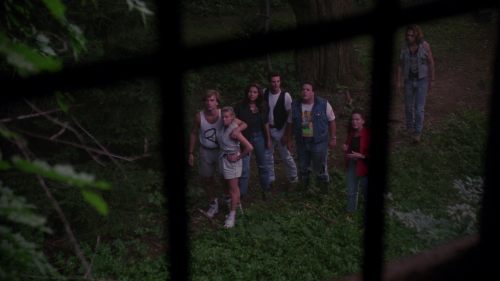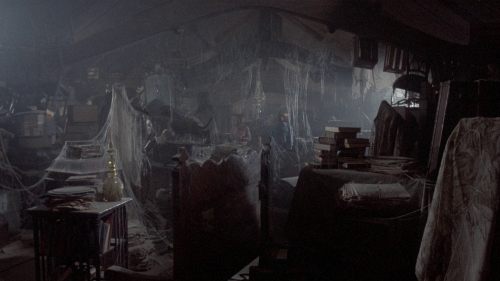Should Old Acquaintance Be Forgot: Watching Billy Wilder’s THE APARTMENT On NYE ‘17
"The mirror, it's broken."
"I know. I like it this way. Makes me look the way I feel."
This exchange occurs during the central reveal in Billy Wilder's happy/sad masterpiece, The Apartment ('60). As C.C. Baxter (Jack Lemmon) gazes into the glass of a splintered compact the girl of his dreams, Fran Kubelik (Shirley MacLaine), keeps on her at all times, he realizes who she is and how he's aided in her mistreatment. What she doesn't know is that he retrieved the item earlier for his boss, Mr. Sheldrake (Fred MacMurray), as C.C. loans out his cozy bachelor pad for the senior suits in his office to carry on their extramarital affairs. What Fran doesn't know is that he knows she's sleeping with Sheldrake, fracturing his heart into splinters while she wonders about the puzzled look plastered on his kindly, brown-nosed mug. All he wants to do is love this woman, who feels like she's never going to get the man she's hopelessly infatuated with to reciprocate the intensity of her affections and leave his current significant other. It's a soulful stalemate that we pick up on, thanks to the incisive screenplay Wilder co-wrote with I.A.L. Diamond (Some Like It Hot ['59]).
2017 was an American Hellscape for multiple reasons. We watched as Donald Trump took office, almost immediately tried to implement racist travel bans, then pandered to the NRA after America experienced not just one, but two of the deadliest mass shootings in modern U.S. history within thirty-five days of one another. Tax reform was put into place that will burden most working middle-class homes while the one percent continue to reap the rewards. White nationalists marched on Charlottesville, Virginia, killing one peaceful protestor (while President Donald blamed "both sides" for the violence). The Harvey Weinstein scandal broke, as brave women came (and continue to come) forward, detailing alleged sexual misconduct on the parts of multiple men many once considered heroes. Perhaps the moment we realized (or at least should've realized) we'd set the bar so low - but nevertheless somehow managed to celebrate hurdling it - was when Alabama almost elected an alleged diddler to the Senate. All the while, black athletes were attacked (again, by the President) for questioning police brutality by refusing to stand for the National Anthem at NFL games. It was a waking nightmare that never wanted to end.
The Apartment's C.C. Baxter is a pimp, though he's hoping that his payments are being kept in escrow in the form of a promotion, while his neighbors are none too shy about confronting the lascivious behavior they attribute to the otherwise harmless office drone. The reason Wilder's movie feels as truthful now as it did in '60 - the same year Psycho, another opus about greed, sex and violence, changed the face of cinema, courtesy of Alfred Hitchcock - is because he paints the corporate world (which, in these individuals' lives, is all they exist for) as a place where pleasure and privilege trump actual principles. Baxter isn't too bothered by the morality of his arrangements, as long as it ends with him getting his corner office and maybe a date with Fran. So, when he glimpses into that cracked mirror, he suddenly sees what he's been enabling the whole time: the shredding of his secret love's very spirit. She's the loneliest girl in New York, except when the key in C.C.'s apartment lock goes click, and Sheldrake holds her in his arms for a few hours.
Baxter's early monologues could possibly double as the dreams of many Americans as we head into '18: a "nice" person, with a reliable job, trendy pad, and goals he's steadily working toward. C.C.'s by no means a rich man, but he's got enough to not only get by, but live comfortably. All you'd have to do is update the figures to modern standards and you'd be illustrating a grind so many individuals engage in on a daily basis. But it's the concessions made regarding individual moral codes that start to chip away at our human fiber, misgivings in the name of moving up. Suddenly, Baxter's not just a guy lending out his key to one higher-up, but has now created such a complicated schedule that he's had to sleep in the park on certain evenings due to conflicts. What's his is not his anymore; he's given away all he's earned in the name of potential future success. When triumph finally comes, there are still strings attached - as Sheldrake essentially blackmails him into giving up another time-share - which Baxter's boss uses to reignite the on-again-off-again fling with Fran.
Miss Kubelik - the bright-eyed, short-haired elevator operator everyone in the building crushes on - is the greatest victim in this cubicle pimp game. A secretarial flunkie (she can type, but can't spell), her lack of specialized skills in the workplace keeps her pressing buttons for these men in suits and the women who take their messages. She has little to no future, and will only be gifted one should she sleep with the superiors at Consolidated Life of New York. Watching Fran get her heart broken and dreams trounced on the final day of '17 brought to mind the words of so many women who claimed to have their careers threatened because they refused to fuck the right powerful producer. It's easy now to view Wilder's Apartment through a lens of antiquated office politics - Joseph LaShelle's sumptuous B&W grain no different than the distancing effect created by Mad Men's impeccable period design - but we were seeing too many Frans come forward in the past few months, their stories all tied to a similar theme of caveman empowerment.
There's a theory floating around that this writer subscribes to - at least on an entry level - that Donald Trump and his ilk have become something of a necessary evil for America to face, in order to realize just how perverted the system can become if we allow it. Baxter's faced with his own necessary evil: shocked out of his complacency when Fran attempts suicide in his pad, downing a whole tube of sleeping pills. The go-getter putz nurses her back to life, and that's where he (and we) gain a true understanding of what both of these folks mean in this universe. "Some people take, some people get took," Fran says to C.C., "and they know they're getting took and there's nothing they can do about it." In the eyes of those in power, that's what both of these people are: commodities, ready to be used up and discarded when they've lived past their usefulness (or threaten to de-seat them, which Baxter would've had he not nobly stood up to his pigish superior and quit). The elevator operator's words reach a blunt nirvana level of truth, which makes them transcend time and setting. Looking back on '17, we're all going to wonder how every decent person seemed to get took, in one way or another (and hope that this isn't just the way it all crumbles, cookie-wise).
So, what can we really do but leave our own Sheldrakes in those booths (just as Fran does in the film's penultimate scene), and go running toward those who we believe own the same sort of fortitude and hope for a new future - albeit with some other job, in some other town. There's no guarantee any year is going to be better or worse than the last, but while "Auld Lang Syne" is sung, plastic cups of champagne clutched in hands, we might as well be by the side of those who at least view us as the mensches (read: human beings) that we are. Wilder's film ends on a note that takes us away from the suicidal tendencies we feel when alone, but doesn't ostensibly spell out that "everything is going to be A-OK." Deal the next hand, trust your feelings if you want to continue being the person you are, and like-minded individuals will find you. The rest send regretful fruitcakes.
We often watch our favorite holiday films as a means of achieving comfort at Thanksgiving, Christmas and New Year's Eve, the glow of the screen providing mental warmth to match the bodily heat we receive from a roaring fireplace. Nostalgic memories of viewing these movies - often with varied, beloved family members - allow us to revisit moments in our lives where things were subjectively "better". Yet while there's certainly a happy ending to The Apartment, it's difficult to discover that same consoling tingle that infects every frame of something like Miracle On 34th Street ('47). The reason Wilder's film remains a masterpiece and so easy to revisit is that he zeroed in on the fact that loneliness and isolation can sometimes be overcome, but the future is still uncertain until we commit to letting our old habits and addictions go by the wayside, and embrace a new way of viewing the road to happiness as we move forward, letting old acquaintance truly be forgot.
The Apartment is available now on Limited Edition Blu-ray from Arrow Home Video.



